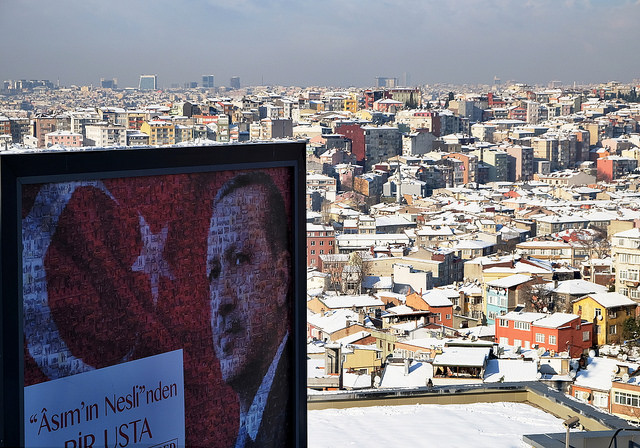Turkey has been going through exceptionally hard times. Very important elections in June and November 2015, followed by an attempted coup in July 2016, entirely changed its political scenery. Society is highly polarised –more than ever, even divided–. While this is the case, a constitutional reform is in the offing, with the public voting on Sunday 16 April. Polls show a neck-to-neck race between the two sides.
Today, the main question is not the constitutional reform itself, but approval of the governing party, and even more so of the figure of President Erdoğan. While this is the case, in this referendum (see the ballot for a clearer idea) the ‘Yes’ campaign is unquestionably being led by the governing Justice and Development Party (AKP), with the support of the National Movement Party (MHP), while the ‘No’ has the backing of a number of different groups. The latter include not only the main opposition Republican People’s Party (CHP) and Peoples’ Democratic Party (HDP), but also the rebel nationalists and other Islamist entities. The number of rebel nationalists will be decisive, as will the vote of conservative Kurds, who used to vote for AKP in previous elections. While the countdown for the constitutional referendum is almost over, one thing is very clear: the result is still very much open.
In any case, this is a highly critical electoral competition for the future of Turkey. The proposed constitutional reform would lead to the most significant changes in the political system since the establishment of the Republic of Turkey in 1923. For this reason, it is important to understand the following points:
- This is not a run-of-the-mill electoral competition. There is too much at stake. If successful, it will involve a constitutional change to an executive presidency, a la turca. Should that be the case, the office of Prime Minister will be abolished, giving the President the authority to select Ministers and appoint the Cabinet while dramatically decreasing Parliament’s monitoring and supervisory rights. According to the new constitutional proposal, the President will be elected directly by Turkey’s citizens for a maximum of two terms of five years. The need for an impartial President is thus removed, while the way is opened for having a head of state attached to a political party. The amendments also define new roles for the Vice-president(s), also selected by the President.
- The campaigning period has been very irregular. Since it has occurred during a state of emergency, all canvassing required central-government approval. The government had the key to both the ‘Yes’ and ‘No’ campaigns. In addition, an international report from the Organisation for Security and Cooperation in Europe (OSCE) has pointed to unfair competition, with the ‘Yes’ campaign benefitting from use of the media and state resources.
- Society is more divided than ever. And one more thing: Turkish citizens are very tired. They are tired both of critical elections and of the prevailing uncertainty. This could raise the ‘Yes’ vote. The government claims that it will continue its bid for increasing the Presidency’s powers in the future even if it is rejected in this referendum. The issue essentially boils down to the government and President Erdoğan himself gaining approval sooner or later.
- There are many undecided voters, in addition to undeclared ‘No’ voters that no poll is able to determine. Thus, the result is very hard to predict. It is clear that a significant percentage of the population are holding their cards close to their chests and preferring not to declare their real intentions in public. How many are doing so is impossible to tell, making any outcome possible.
- Turnout, both at home and abroad –after all the crises with European countries– is a very important issue. So far, the available information suggests an increase in turnout among the Turkish population abroad. But this mobilisation could work either way: nationalistic voters will opt for ‘Yes’ while voters concerned about their own situation and their standards of living in the event of a further estrangement with Europe are likely to tend towards a ‘No’ vote.
There are so many unknown factors that an accurate prediction about the referendum’s result is almost impossible. Nevertheless, we shall soon know the result.



